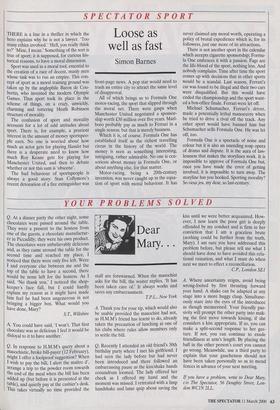SPECTATOR SPORT
Loose as well as fast
Simon Barnes
THERE is a line in a thriller in which the hero explains why he is not a lawyer. 'Too many ethics involved."Hell, you really think so?"Mine, I mean.' Something of the sort is true of sport; it is supposed, for curious his- torical reasons, to have a moral dimension.
Sport was used as a moral tool, essential to the creation of a race of decent, manly men whose task was to run an empire. This con- cept of sport as a moral training ground was taken up by the anglophile Baron de Cou- bertin, who invented the modem Olympic Games. Thus sport took its place in the scheme of things, on a crazy, unwieldy, charming and tottering Heath Robinson structure of morality.
The confusion of sport and morality accounts for a lot of odd attitudes about sport. There is, for example, a prurient interest in the amount of money sportspeo- ple earn. No one is worried about how much an actor gets for playing Hamlet but there is a desperate need to know how much Roy Keane gets for playing for Manchester United, and then to debate whether or not this sum is 'obscene'.
The bad behaviour of sportspeople is always a good story: Stan Collymore's recent detonation of a fire extinguisher was front-page news. A pop star would need to trash an entire city to attract the same level of disapproval.
All of which brings us to Formula One motor-racing, the sport that slipped through the moral net. There were gasps when Manchester United negotiated a sponsor- ship worth £30 million over five years. Marl- boro probably pay as much to Ferrari in a single season; but that is merely business.
Which it is, of course. Formula One has established itself as the richest travelling circus in the history of the world. The money is seen as something interesting, intriguing, rather admirable. No one is cen- sorious about money in Formula One, or about anything else, for that matter.
Motor-racing, being a 20th-century invention, was never caught up in the equa- tion of sport with moral behaviour. It has never claimed any moral worth, operating a policy of brutal expedience which is, for its followers, just one more of its attractions.
There is not another sport in the calendar which accepts cigarette sponsorship; Formu- la One embraces it with a passion. Fags are the life-blood of the sport, nothing less. And nobody complains. Time after time the sport comes up with decisions that in other sports would be a scandal. Last season, Ferrari's car was found to be illegal and their two cars were disqualified. But this would have ended the championship and the sport want- ed a box-office finale. Ferrari were let off.
Michael Schumacher, Ferrari's driver, made a potentially lethal manoeuvre when he tried to drive a rival off the track. Any other sport would have banned him but Schumacher sells Formula One. He was let off, too.
Formula One is a spectacle of noise and colour but it is also an unending soap opera of drama and dispute. It is the aura of law- lessness that makes the storylines work. It is impossible to approve of Formula One but, once you have made the error of getting involved, it is impossible to turn away. The storyline has you hooked. Sporting morality? So vieux jeu, my dear, so last-century.


































































 Previous page
Previous page